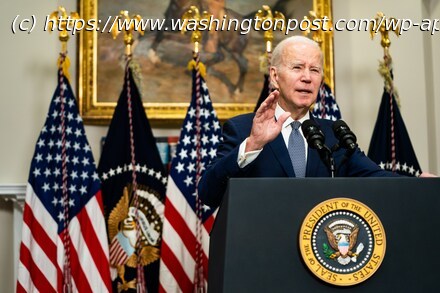President Biden scrambles to reaffirm the stability of banking system as bank failures present a new political and economic peril.
President Biden told advisers late last week that he objected to any prospective aid for the collapsed Silicon Valley Bank that could be cast as a bailout or would reward those who ran the banks or invested in them.
By Sunday, the president had agreed to a sweeping intervention that would protect all the bank’s depositors, including large companies. Some Republicans say Biden did what he said he wouldn’t — offer a bailout that rewards the undeserving — but the White House argues that the president’s plan is aimed narrowly at protecting small businesses, nonprofits and thousands of ordinary workers whose jobs were at risk of being wiped out by the bank’s failure.
Either way, the president’s private concerns — stemming in part from his belief that the federal government had been too friendly to big banks amid the 2008 financial crisis — highlights the explosive nature of any proposal that is seen as providing federal assistance to wealthy individuals and powerful business groups.
The politics surrounding the federal intervention are complicated for both parties, who are highly sensitive to any charge that they are beholden to elites at the expense of working-class Americans. The back and forth was an echo of the politics surrounding the 2008 financial crisis, when both parties felt the wrath of voters amid a perception that they had bailed out powerful financiers responsible for the suffering of ordinary Americans.
But it also foreshadows the upcoming presidential campaign, with Biden and his likely Republican rivals all keen to emphasize their allegiance to blue-collar Americans.
Just a few days after proposing a budget that calls for trillions in new tax hikes on the rich and corporations, Biden tried to cast his administration’s bank intervention as part of his economic populism. In a five-minute speech Monday morning, he talked about the need to protect small businesses four separate times.
“Small businesses across the country that had deposit accounts at these banks can breathe easier knowing they’ll be able to pay their workers and pay their bills,” Biden said. “And their hard-working employees can breathe easier as well.”
Senior administration officials, sensitive to the political landscape, consciously crafted a plan aimed at avoiding the “bailout” moniker. The aides — including Chief of Staff Jeff Zients, Treasury Secretary Janet L. Yellen and Lael Brainard, director of the National Economic Council — also gave Biden specific anecdotes to demonstrate that the types of victims who were at risk from the bank’s collapse went beyond large firms and venture capitalists.
Biden, who continued to have doubts into the weekend, also held conversations with other officials, including California Gov. Gavin Newsom (D).
But the administration’s actions still ignited a firestorm, with Republican critics charging that the government had mobilized to protect business interests influential in the Democratic Party. Still, it was not clear if even the dramatic actions approved by the administration would be sufficient to stave off the financial panic, with bank stocks sliding by double-digits on Monday.






